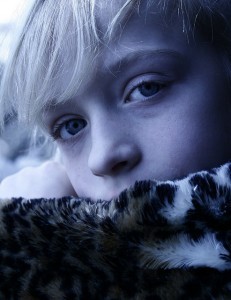Bullying and Depression in Children

“Winter Blues”
Pink Sherbet Photography
Children and adolescents who are involved in bullying face a lot of psychological issues; depression is one of them. Researchers have discovered a strong relationship between bullying and depression. Bullying has serious long term consequences; people who were bullied as children are more likely to suffer from depression. Hence, it is crucial for parents and teachers to become familiar with the signs and symptoms of depression. They should also able to understand the factors which are responsible for triggering the depressive symptoms, and of course, bullying is a major component.
What is Bullying?
Bullying is a willful, repetitive act seeking to control another person. Children who are bullied as well as those who bully others both face lasting psychological consequences. Here’s a definition:
Bullying is when someone with more power repeatedly and intentionally causes hurt or harm to another person who feels helpless to respond.
Building Respectful and Safe Schools, 2010 reports four types of bullying:
- Physical Bullying: This includes hitting, kicking, tripping, pinching, pushing and damaging property.
- Verbal Bullying: Includes name calling, insults, teasing, verbal abuse, and intimidation.
- Covert Bullying: Often harder to recognize and carried out behind the bullied person’s back, this includes lying and spreading rumours, negative facial or physical gestures, nasty jokes with an aim to embarrass or humiliate, mimicking, and encouraging others to socially exclude someone.
- Cyber Bullying: This includes online bullying behaviour – over a social network, for instance, or using a mobile phone to harass.
Reasons for Bullying in Children
Some children bully others because:
- They feel the need to dominate and control others.
- They want to show off to their peers.
- Sometimes, those children who have themselves been bullied go on to bully others.
- Some children have a noticeable lack of empathy or do not understand that what they are doing is wrong.
Is your child a victim of bullying? Read more about supporting children at school and protecting them from bullying.
What is Depression?
Depression is more than feeling blue. A common but serious illness, depression can become a major concern if a person does not acquire the necessary coping mechanisms to address his or her problem.
According to MediLexicon’s Medical Dictionary, depression is defined as:
A mental state or chronic mental disorder characterized by feeling of sadness, loneliness ,despair, low self esteem, and self reproach; accompanying signs include psychomotor retardation, withdrawal from social contact, and vegetative states such as loss of appetite and insomnia.
According to the National Institute of Mental Health, there are several kinds of depressive disorders:
- Major Depression: This is characterized by symptoms that interfere with a person’s ability to work, sleep, study and eat.
- Dysthymic Disorder: Characterized by long term symptoms that can prevent normal functioning.
- Minor Depression: Characterized by having symptoms for two weeks or longer. There are different types of minor depression, including psychotic depression, postpartum depression, and seasonal affective disorder.
More on Depression
Top 5 Things to Do to Support a Family Member with Depression.
Relationship between Bullying and Depression in Children
Victims of bullying are particularly at risk for experiencing low self-esteem and suffering from depression. In a study by Margit Averdijk and others in 2011, the relationship between bullying victimization at age 8 and anxiety and depression at age 11 was investigated. The results of the study clearly indicated that different measures of bullying victimization significantly predicted anxiety and depression at later stages. The children showed symptoms of depression, including low energy, social withdrawal, passive behaviour, excessive crying, and having an obsessive and negative feeling. Children who are both bullying and being bullied are most likely to be diagnosed with depression. In another study, by Riittakerttu Kaltiala-Heino and Sari Fröjd, the correlation between bullying and clinical depression in adolescent patients was examined. The study analysed how:
- Involvement of children in bullying at school predicts depression
- Depression predicts involvement in bullying in middle adolescents
For this purpose, boys and girls were surveyed at 15 years of age and followed up two years later in the Adolescent Mental Health Cohort study. Depression was measured by Finnish Modification and bullying was elicited by three questions focusing on being a bully, being a victim to bullying, and being left alone. The result of the study summarized that being a victim to bullying and being a bully predicted later depression. The researchers also noted that social withdrawal is a major pathway from bullying to depression. Socializing becomes gains importance in the teenage years and the children who experience social difficulties due to bullying or rejection may develop depression. Psychological disorders in children and their family also play a major role in the development of bullying behaviour and, in later stages, leads to the development of depression.
The link between bullying and depression also extends to other problems like:
- Low self-esteem
- Anxiety
- Physical illness
- Incidence of suicide in teenagers
Riittakerttu Kaltiala-Heino also studied the prevalence of suicidal ideation in children affected by bullying. The school survey provided evidence that there was an increased prevalence of depression and severe suicidal tendencies among those who were bullied and those who were bullies.
The results of a number of studies conducted by researchers provide clear evidence that bullying and depression are linked with each other and both bullies and victims are at increased risk of developing depression in later stages of life. Early psychological intervention thus becomes very important for the victim as well as the bully.
Child Practitioners at the Centre
Visit our practitioner page to know more about the child practitioners at the center. To get an appointment or to make enquiries, please call (03) 9820-5577.




